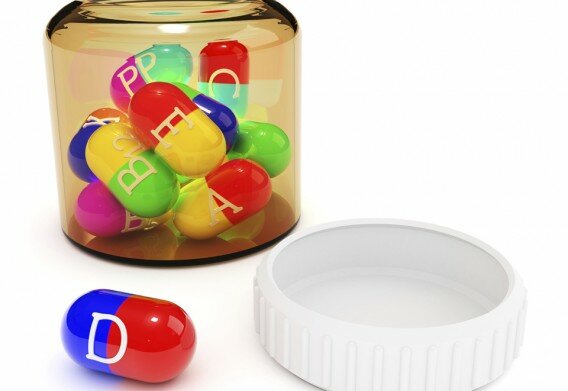Bone-Building Combo Helps To Cut Body Fat Too
Produced in response to sunlight, vitamin D is known to have potential immune-enhancing effects. And since the past summer here in the UK was not exactly the sunniest you might hav...
Read MoreVitamins are vital nutrients that our bodies need in small amounts in order to function properly. Vitamins are predominantly obtained through our diets, with the exception of vitamin D, and are required to stay free from illness or disease.
There are two types of vitamins, fat-soluble and water-soluble. Fat-soluble vitamins are mainly predominantly in fatty foods and animal products, for example milk and dairy, eggs, liver, oily fish and vegetable oils. Our bodies don’t need fat-soluble vitamins every day as they’re stored in our livers and fatty tissues. As with all things, too many can do our bodies harm. Fat-soluble vitamins are: Vitamin A, D, E and K.
Water-soluble vitamins cannot be stored and so therefore are required much more frequently. As such, when you consume too many water-soluble vitamins they are excreted in the urine and so when taken in large quantities can’t do the body harm. These vitamins are found in a wide range of foods, including fruit, vegetables, potatoes, grains, milk and dairy foods. Due to their water-soluble nature, these vitamins are often lost when boiled, so it may be worth grilling/steaming or consuming in a soup/stew. Vitamin C and B vitamins are classed as water-soluble vitamins.
Considering how nutrient deficient the Western diet is, most people lack optimum levels of vital vitamins like vitamin D, K, C and E.
These vital nutrients have a diverse biochemical functions. Vitamin D, for instance, synthesises hormones, helps with mineral metabolism and the regulation of cell and tissue growth. Vitamin C and E act as antioxidants and help protect the body against free-radical damage.
Supplementing with vitamins is an essential part of maintaining a healthy body to help prevent disease, plugging the gaps left behind by a vitamin-deficient diet. And while the mainstream keeps dispelling the benefits of supplements, the Daily Health will help you make sense between the facts and fiction when it comes to the health benefits of supplementation.

Produced in response to sunlight, vitamin D is known to have potential immune-enhancing effects. And since the past summer here in the UK was not exactly the sunniest you might hav...
Read More
Back in 2008, we told you about a study, conducted by researchers at Johns Hopkins Alzheimer's Disease Research Centre, which showed that vitamin E may have a positive effect on th...
Read More
In the past few years, vitamin D, the sunshine vitamin, has proven to be one of the most powerful disease-fighting vitamins out there, with benefits ranging from boosting your immu...
Read More
Every now and then the mainstream comes out with research findings, which supposedly reveal how supplements are nothing short of detrimental to your health. The latest victim is c...
Read More
According to a recent news article reporting on the latest vitamin study, vitamin B12 failed to improve the mental function of the participants. The results of the study, publishe...
Read More
"Oh dear..." That's really all I have to say about the recent supplement-bashing headlines that many of you may have seen in the news: "Excessive use of dietary supplements linked...
Read More
When you write about the latest alternative health breakthroughs and the benefits of natural medicine on a daily basis, like I do, then you come across many feeble (often laughable...
Read More
The importance of vitamin D and its role in achieving optimum health is indisputable, despite the fact that some mainstream naysayers would like us to believe the contrary. (See ou...
Read More
Our regular readers will know that optimising your vitamin D levels is essential for good health. Numerous studies have shown how the sunshine vitamin boosts and protects almost ev...
Read More
It's probably the single most important thing you can do to stay out of the hospital... and even a nursing home. It's NOT a drug and you'll be surprised to know that I am also not...
Read More
